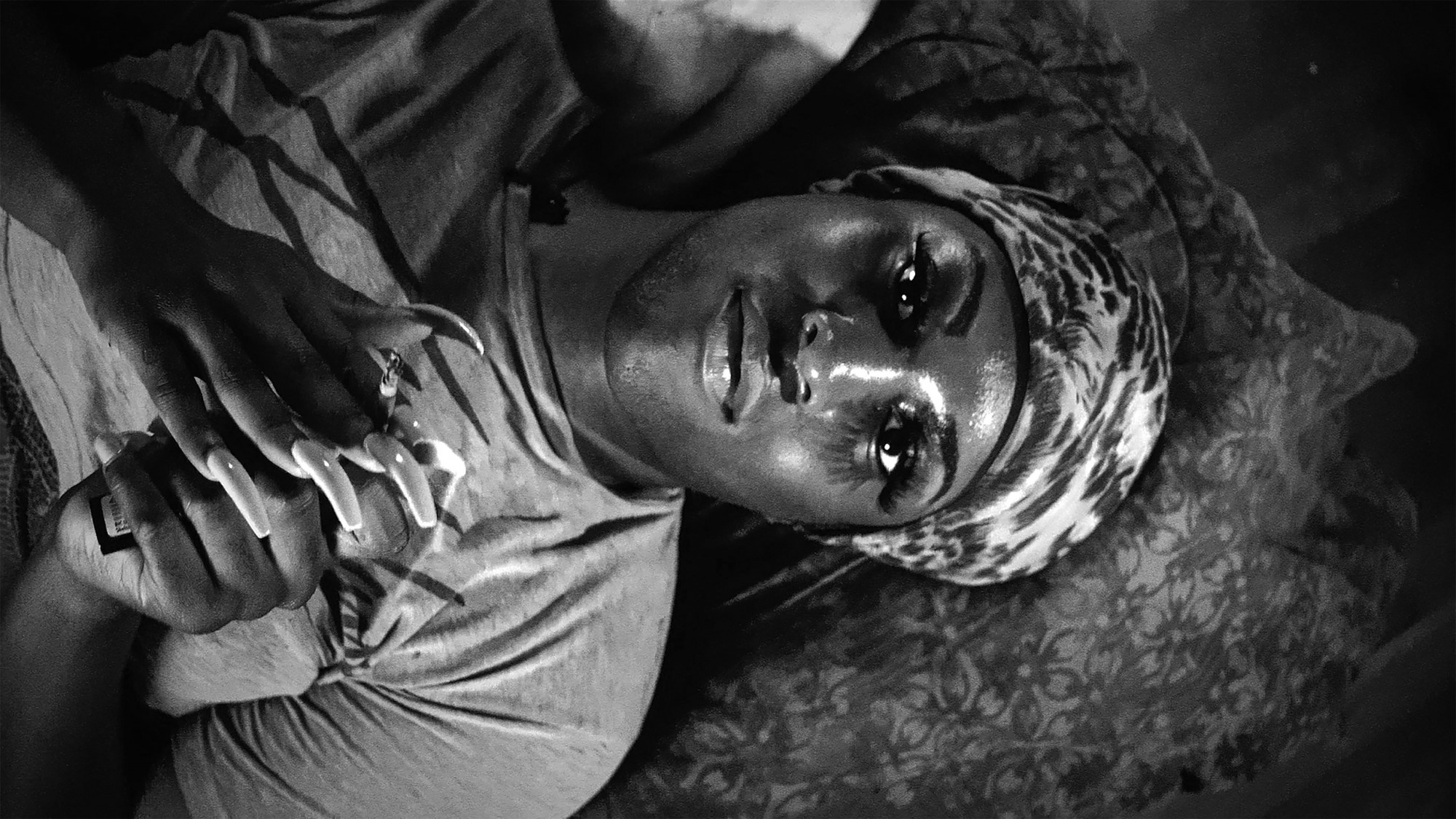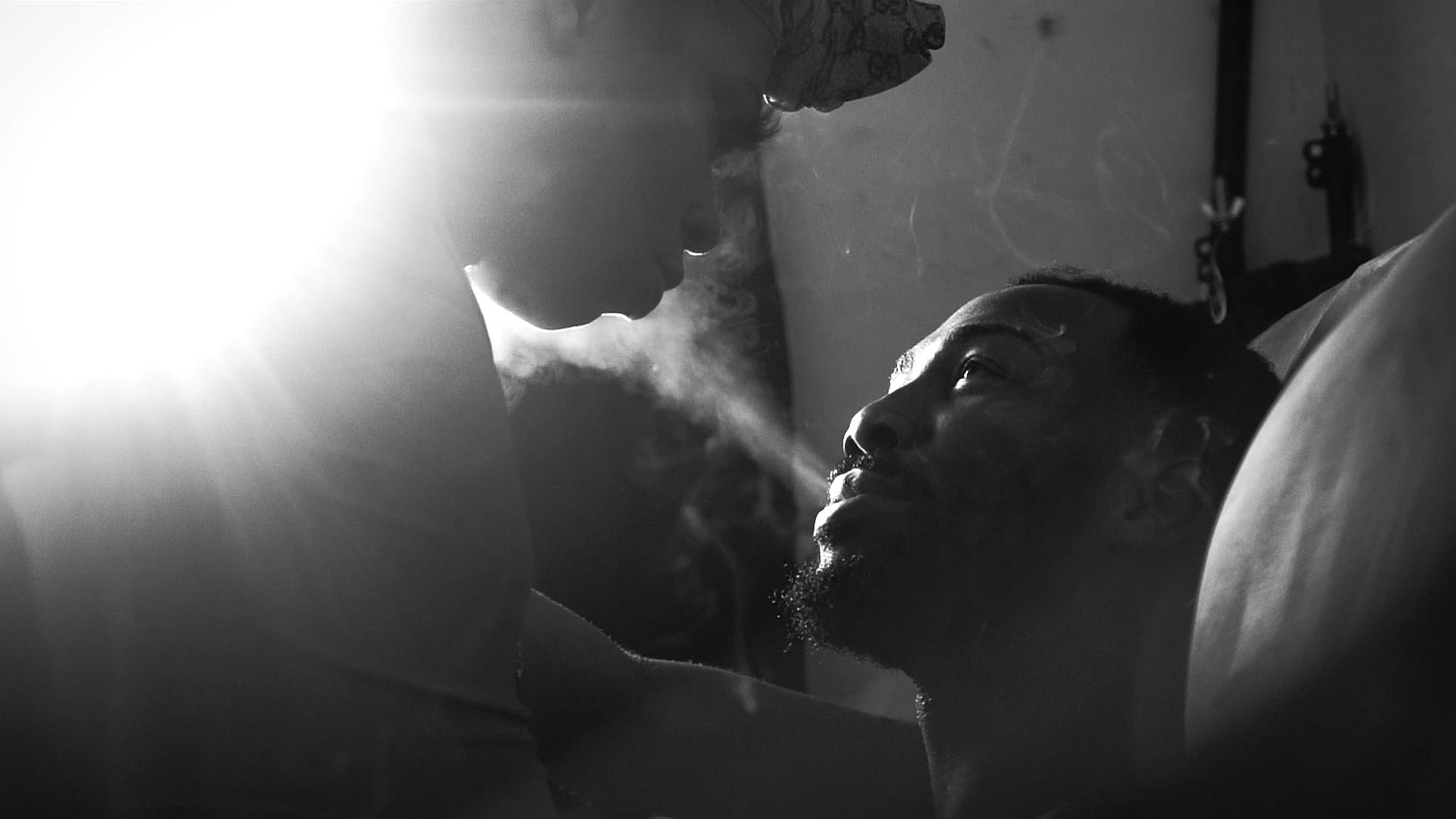
Liyah Mitchell in KOKOMO CITY. Photo courtesy Magnolia Pictures
Love Letter from Kokomo
D. Smith's documentary explores the lives of Black trans women
By Jewel Wicker
D. Smith was lounging with a glass of wine by a pool in Miami when she got the call that she should return to Park City, Utah, for the remainder of the Sundance Film Festival.
She’d spent days at the festival in January premiering KOKOMO CITY, her black-and-white directorial debut that documents the experiences of four trans women who’d done sex work in New York City and Atlanta. Following the screenings, Smith had boarded a flight to the South Florida city where she’d spent much of her childhood.
Meanwhile, in Park City, KOKOMO CITY had been nominated for both the Sundance Film Festival’s NEXT Innovator Award and Audience Award. Even if the documentary didn’t win either, she decided, maybe it actually was a good idea to be present. In many ways, Smith had already done what she’d set out to do. An accomplished music producer and former reality TV star, Smith had successfully proven she could make an impact in a new industry. She hadn’t even owned a camera before conceptualizing KOKOMO CITY, and now it was premiering at Sundance. The nominations were a big deal.
That week, many of the film’s stars met for the first time. Daniella Carter recalls meeting Koko Da Doll and instantly forming a bond through jokes and the shared experience of the film. Liyah Mitchell says she spent most of her time at Sundance awestruck by both the celebrities and directors she spotted, as well as the amount of admiration KOKOMO CITY garnered. She’d been vulnerable and shared her story. In Utah, she got to watch it resonate with people. “The whole time, it just felt like a dream that it made it to that level,” Mitchell says.
Smith returned to Utah just in time to watch her documentary win both awards. “I was in shock,” she says.
SHOOT ME DOWN is tattooed across Smith’s chest, the words visible during our interview on Zoom. They are lyrics to a standout cut from Lil Wayne’s 2008 critically acclaimed album Tha Carter III. Smith, who was working as a music producer at the time, produced and sang on the song. Billy Porter, Keri Hilson, and Monica are also among the artists Smith has worked with. “I’ve only done music my entire life. I don’t know anything else. I’ve never had a job [outside of music],” she says. Film was a pivot, though not completely unfamiliar.
Smith says the momentum she’d built and the connections she’d made during her time working as a producer felt irrelevant when she came out as transgender. “I faced a lot of hardship,” she says. She chronicled this time on VH1’s Love & Hip Hop: Atlanta, appearing in the show’s fifth season in 2016, in the hopes of bringing more awareness to the transgender community while also building relationships with artists like CeeLo Green to advance her music career. By the end of the season, Smith announced that she wouldn’t return for a second season, saying she was “uncomfortable with the dialogue” on the show and the way she was portrayed. “The purpose for the reality show was to entertain. It was, in my opinion, never to educate [or] elevate. I knew that going into it, but my arrogance thought I could change the world, change who they are by just being me. It was ego that drove me to do that show,” she says, reflecting on that time.
Without the income from the show, and despite her early recording success, she struggled to gain enough work to sustain herself in music; as a result, Smith says she experienced homelessness in New York, often sleeping on people’s floors and in cars. But that’s when she landed on the idea of the documentary. It was, perhaps, the quest for a creative form that would allow her to tell what she believed to be a more authentic truth that inspired the idea. The title of the project is a nod to Kokomo Arnold, the artist behind the 1930s queer song “Sissy Man Blues.”
“KOKOMO CITY really came out of me being desperate and trying to figure out ‘How can I be creative and not result to sacrificing my integrity doing something that I’d regret or that’s not for me,’” she says. “The idea felt, to me, divine and God-given. It felt like I was completely, totally aligned with my purpose, literally for the first time in my life.”
She reached out to a few directors, but they all declined to participate. Eventually, she decided to make the film on her own. A friend gave her money to buy her first video camera, and she got to work. First, she combed through the comment sections and replies in the social media accounts of prominent trans women, looking for potential subjects. Her goal was to find women with smaller follower counts who had compelling stories. Soon she landed on Daniella Carter and Dominique Silver of New York and Koko Da Doll and Liyah Mitchell of Atlanta.
To ensure her sources were comfortable, Smith says she’d talk with them before turning her camera on. They’d smoke. They’d drink. Then they’d get to work. The result is a candor sometimes revealed in intimate shots of the women lounging on their beds. In the notable opening scene, Mitchell recalls an encounter with a man that included the two of them fighting to gain control of his gun and ended with them eventually deciding to still have sex. KOKOMO CITY uses humor to explore trauma, with the handheld camera often shaking from Smith’s laughter. Sometimes, she laughed so hard she had to cover up the shakiness with B-roll.
“I’ve always had an eye for composition and style, but I’ve never shot a film.…But I had a vision. It was clear as day to me,” Smith says. “I think what makes KOKOMO CITY so…, what draws people to KOKOMO CITY is the fact that I didn’t know the ropes. I didn’t know the rules. I did what the hell I wanted to do. As a creator, that’s what I’ve always wanted.”

Rich-Paris and XoTommy in KOKOMO CITY. Photo courtesy Magnolia Pictures
The black-and-white film alternates between telling the women’s stories and speaking to Black men about masculinity, sexuality, and the ways their ideas of each have impacted their lived experiences. In one sobering scene, Silver examines the relationship between violence and fetishizing trans women. “Violence doesn’t happen before the orgasm, it happens after,” she says, noting that the moment of vulnerability often collapses into regret for men who are grappling with their own identities.
In multiple scenes, a music producer named Lo details his attraction to a trans woman and explores why he’s hesitant to meet up with a woman who hasn’t undergone gender confirmation. He says it feels like a reminder that “she’s not all the way a woman yet.” The sentiment is harmful, of course. Trans women’s identities are valid whether or not they’ve undergone any type of treatment to align their physical characteristics with their gender identities. But Lo’s candor about his notions of gender and sexuality—and learning to accept his attractions as a cis man—is one of the most raw and honest depictions of this journey we’ve ever seen on film. This seems to be a direct result of the safe space Smith was determined to create for her subjects.
Nothing emphasized the importance of these conversations more than the death of Koko Da Doll, otherwise known as Rasheeda Williams, in April. The thirty-five-year-old was found dead from a gunshot wound on a sidewalk in southwest Atlanta. A seventeen-year-old boy was subsequently arrested and charged with murder, aggravated assault, and possession of a firearm during the commission of a felony.
In the film, Koko Da Doll speaks about turning to sex work as a means of survival, as well as her dream of becoming a rapper. Hearing her recall two near-fatal encounters she’d faced at the hands of clients (“A lot of girls do not make it out,” she says) is heartbreaking. Knowing she was killed shortly after the film’s release is devastating.
At the time of her death, Atlanta police said she was the third transgender woman to be a victim of a violent crime in the city in 2023. The Human Rights Campaign, which has tracked violent deaths within the United States’ transgender and gender non-conforming community since 2015, lists Williams as one of twelve in 2023. At least thirty-eight trans people were killed in 2022, according to the organization. HRC notes that although most of these victims were killed by partners and acquaintances, even when there wasn’t an overt anti-trans bias in these cases, “the victim’s transgender or gender non-conforming status may have put them at risk in other ways, such as forcing them into unemployment, poverty, homelessness and/or survival sex work.” Black transgender women like Williams are disproportionately impacted.
Smith and Koko’s costars, Mitchell and Carter, agree. They say Koko Da Doll is now forever immortalized by the documentary.
“Within thirty seconds of our conversation, I knew. She had started crying on the phone about how much she wanted to tell her story.… The fact that I was blessed enough to be a part of her life and to crystallize her words, and to memorialize her presence in the film…. People will always be able to hear her and know what a beautiful person she was,” Smith says.
After the success at Sundance, KOKOMO CITY’s executive producer Stacy Barthe brought Lena Waithe and Rishi Rajani of Hillman Grad Productions on board as additional executive producers. William Melillo is also an executive producer. Magnolia Pictures has acquired and will distribute the film. Thanks to a strong debut, Smith has signed on with CAA talent agency. She has her sights set on fictional projects in the future—it’ll be a different artistic challenge for the creator.
For the surviving stars of the film, what lies ahead is unclear. But Carter says she hopes the documentary will bring about a welcome shift in how media depicts and engages with the broad spectrum of trans experiences.
“KOKOMO CITY is a love letter to all Black trans people who have felt overlooked, like their stories haven’t been told,” she says. “[It’s] letting them know this is what the future looks like, not only for us to be able to tell our stories but to redefine them.”



